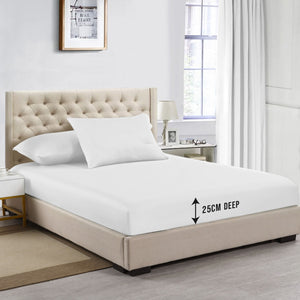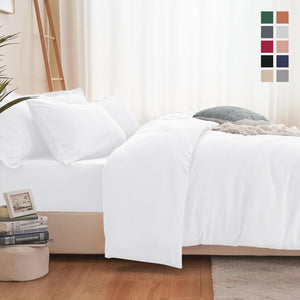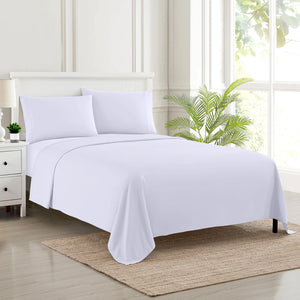UK Bed Sizes in CM and Inches - Dimensions Guide
When deciding on a bed size, it's essential to think about how much room you have and how you like to sleep. Bed sizes in the UK might vary, so knowing the measurements before you buy is essential. This guide will help you choose the right bed size in the UK, whether you're looking for a crib for your baby or a super king for your main suite.
UK Bed Size Chart (CM & INCHES)
| BED SIZE | WIDTH x LENGTH (CM & Inches) |
|---|---|
| Cot Bed | 70cm x 140cm (27.5 inch x 55 inch) |
| Toddler Bed | 70cm x 140cm (27.5 inch x 55 inch) |
| Small Single Bed | 75cm x 190cm (30 inch x 75 inch) |
| Single Bed | 90cm x 190cm (35 inch x 75 inch) |
| Small Double Bed | 120cm x 190cm (47 inch x 75 inch) |
| Double Bed | 135cm x 190cm (53 inch x 75 inch) |
| King-Size Bed | 150cm x 200cm (59 inch x 79 inch) |
| Super King Bed | 180cm x 200cm (71 inch x 79 inch) |
| European Bed Sizes | |
| European Single Bed | 90cm x 200cm (35 inch x 79 inch) |
| European Double Bed | 140cm x 200cm (55 inch x 79 inch) |
| European King Bed | 160cm x 200cm (63 inch x 79 inch) |
What Size Is A Cot Bed?
Cot beds are designed for infants and toddlers. They are a transitional option between a crib and a single bed, allowing your child to sleep comfortably as they grow. In the UK, cot bed sizes typically measure around 70cm x 140cm (27.5 inches x 55 inches). These dimensions offer ample space for your baby to sleep soundly while leaving room for growth.
What Size Is A Toddler Bed?
Toddler beds are suitable for children who have outgrown their cot beds but are still getting ready for a single bed. Toddler bed sizes typically measure around 70cm x 140cm (27.5 inches x 55 inches), making them a perfect fit for small children. The familiar dimensions offer a seamless transition from cot to toddler beds.
What Size Is A Small Single Bed?

A small single or "shorty" bed is ideal for small bedrooms or guest rooms. It measures approximately 75cm x 190cm (30 inches x 75 inches). While it provides a compact sleeping space, it may not suit taller individuals who need extra length for a comfortable night's sleep.
What Size Is A Single Bed?
A standard single bed is the most common choice for children's rooms and guest bedrooms. It measures around 90cm x 190cm (35 inches x 75 inches). Single beds offer a comfortable sleeping space for one person and are versatile in various room sizes.

Single Duvet Cover Set
Shop NowWhat Size Is A Small Double Bed?

Small double beds, known as three-quarter beds, offer more room for single sleepers who desire extra space. These beds typically measure around 120cm x 190cm (47 inches x 75 inches). They are an excellent option for teenagers or adults who prefer more room to stretch out.
What Size Is A Double Bed?

A double bed is a popular choice for couples. It provides more space than a single or small double bed, measuring approximately 135cm x 190cm (53 inches x 75 inches). This extra space ensures a more comfortable night's sleep for two people.
What Size Is A King-Size Bed?

King-size beds are the epitome of comfort, offering a spacious sleeping area for couples. In the UK, king-size bed dimensions are approximately 150cm x 200cm (59 inches x 79 inches). With this size, there's ample room for two people to sleep without feeling cramped.
What Size Is A Super King Bed?

For those who crave even more space, super king beds are the ultimate choice. These luxurious beds measure approximately 180cm x 200cm (71 inches x 79 inches). Super king beds provide plenty of room for couples who want to enjoy a genuinely opulent sleep experience.
What Size Is A European Bed Size?
European bed sizes may differ slightly from their UK counterparts.

- A European single bed typically measures 90cm x 200cm (35 inches x 79 inches). It is similar in width to a UK single bed but longer in length.
- The most common European double bed size is approximately 140cm x 200cm (55 inches x 79 inches).
- On the other hand, European king-size beds are about 160cm x 200cm (63 inches x 79 inches).
If you have a European mattress, you must know these measurements to ensure you choose the right bedding and accessories.
Recommended Room Size for Each UK Bed
Choosing the right bed also means ensuring it fits your room well. You should have enough space to walk around the bed, open wardrobes, or add bedside tables.
Minimum Room Sizes for Each Bed Type
| Bed Type | Bed Size (cm) | Recommended Room Size (cm) | Recommended Room Size (feet) |
|---|---|---|---|
| Cot Bed / Toddler | 70 x 140 | 180 x 240 | 6ft x 8ft |
| Small Single | 75 x 190 | 200 x 270 | 6.5ft x 9ft |
| Single | 90 x 190 | 210 x 270 | 7ft x 9ft |
| Small Double (Queen) | 120 x 190 | 240 x 270 | 8ft x 9ft |
| Double | 135 x 190 | 270 x 270 | 9ft x 9ft |
| King | 150 x 200 | 300 x 300 | 10ft x 10ft |
| Super King | 180 x 200 | 330 x 300 | 11ft x 10ft |
Rule of Thumb for Room-to-Bed Fit
-
Leave at least 60 cm of clearance on each side of the bed.
-
Add 40 cm to the bed length to account for headboards or footboards.
-
Make sure doors and drawers can open easily.
How To Measure A Bed Size?
To measure your bed accurately, follow these steps:
- Use a tape measure: Measure the length and width of your mattress in centimetres or inches. Start at the top left corner and end at the bottom right corner to get the correct measurements.
- Be precise: Measure to the nearest centimetre or inch to ensure a snug fit for your bedding and bed frame.
- Account for mattress depth: Remember to measure the depth of your mattress, as it can affect the fit of fitted sheets and other bedding items.
Step-by-Step Guide
- Measure your room size (Length × Width) in cm or feet.
- Subtract 120 cm (or 4 feet) from both room dimensions. (This allows for 60 cm walking space on each side of the bed.)
- Compare the result to the bed’s dimensions. (If your room space (after subtraction) is equal to or more than the bed size, it fits comfortably.)
Example
Room size: 300 cm × 300 cm
Minus clearance: 300 − 120 = 180 cm (usable width/length)
Can a king-size bed (150 × 200 cm) fit?
Yes, because 150 < 180 and 200 < 180 (though the length is tight).
Quick Fit Reference Table
| Bed Size | Minimum Room Size (cm) | Pass/Fail for 300cm Room |
|---|---|---|
| Small Single | 200 × 270 | ✅ |
| Double Bed | 270 × 270 | ✅ |
| King Bed | 300 × 300 | ✅ |
| Super King Bed | 330 × 300 | ❌ (too wide) |
UK Bedding Sizes Chart (for Duvets, Sheets, Mattress Toppers)
| Bed Type | Duvet Size (cm) | Fitted Sheet Size (cm) | Mattress Topper (cm) |
|---|---|---|---|
| Cot Bed | 120 x 150 | 70 x 140 | 70 x 140 |
| Single | 135 x 200 | 90 x 190 | 90 x 190 |
| Small Double | 200 x 200 | 120 x 190 | 120 x 190 |
| Double | 200 x 200 | 135 x 190 | 135 x 190 |
| King | 225 x 220 | 150 x 200 | 150 x 200 |
| Super King | 260 x 220 | 180 x 200 | 180 x 200 |
Tip: Always check product descriptions on sites like Yorkshire Bedding for sizing before buying.
Bed Sizes and Standard Mattress Thickness
| Bed Type | Average Mattress Thickness (cm) | Notes |
|---|---|---|
| Cot / Toddler | 10–12 | Must meet UK safety standards |
| Single | 18–25 | Common for foam and spring |
| Double | 20–30 | Pillow-top types are thicker |
| King/Super King | 25–35 | Hybrid & orthopaedic options |
Imp Note: Mattress depth affects sheet fit and headboard height.
Conclusion
Knowing the right bed size helps you sleep better and plan your room better. Whether you’re buying for a child, a guest room, or an upgrade to your bedroom, the size makes all the difference.
From cot beds at 70 × 140 cm to super king beds at 180 × 200 cm, each size has a purpose. European beds add a few extra centimetres in length—great for taller people. When planning your space, remember to factor in the walking room and mattress depth.







